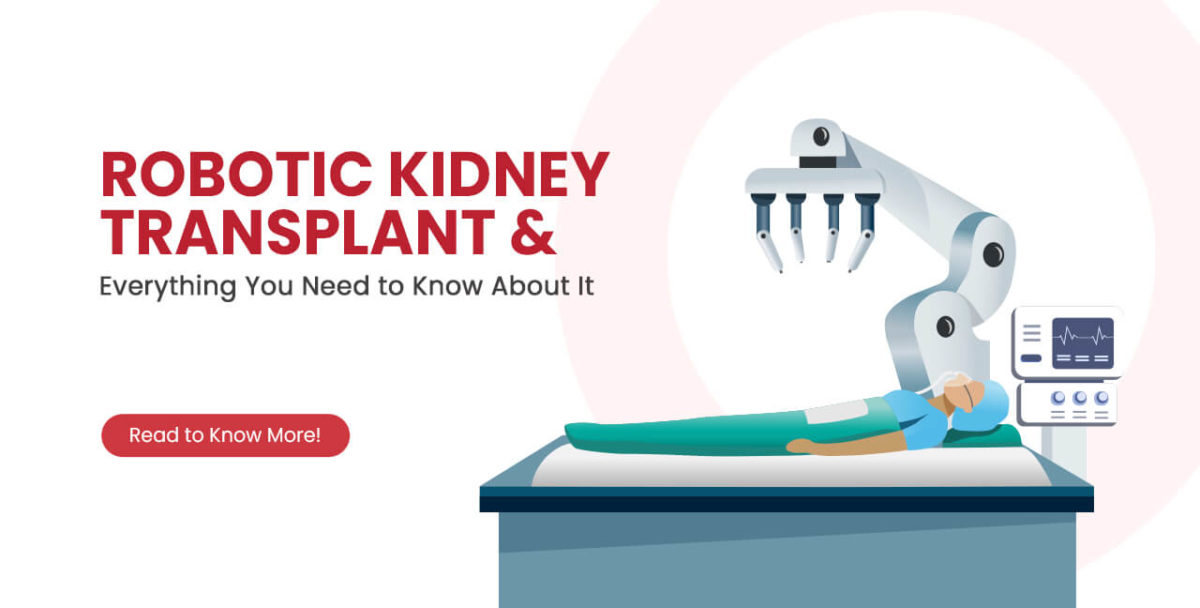Robotic Kidney Transplant: Everything to Know About

A kidney transplant is a surgery where a damaged kidney is replaced with a healthy one from a donor. The kidney could come from a deceased organ donor or a living donor. In certain cases, the family members or individuals who are a good match may be willing to give one of their kidneys. This form of transplant is known as a live transplant.
In comparison to traditional kidney transplant surgery, robotic-assisted kidney transplant allows for smaller incisions. A little incision in a robot-assisted surgery reduces the likelihood of problems such as hernia and infection.
Renal Transplantation Surgery
Renal Transplantation is another name for kidney transplantation. This surgery comprises the transplantation of a healthy kidney from a living or deceased donor into a patient whose kidneys are no longer functioning properly. Renal transplantation surgery is performed in patients who are suffering from ESRD ( End-stage renal disease).
End-stage renal disease, also known as end-stage kidney disease or kidney failure, occurs when your kidneys stop working properly to meet your body’s needs. This stage causes gradual loss of kidney function and progresses to an advanced state which could prove fatal.
Benefits of Robotic Surgery on Kidney Transplantation
- Faster Recuperation: A smaller incision with a robotic-assisted transplant means the patient will have less to heal from, minimizing recovery time and allowing for a quicker return to work and daily activities.
- Reduced discomfort and hospitalization: The surgical techniques of smaller incisions in robotic-assisted kidney surgery involve less discomfort for the patient. Reduced discomfort paired with a faster recovery time implies that a patient usually leaves the hospital sooner than with an open kidney transplant.
Robotic surgery on kidney transplant provides surgeons with the following advantages:
Relief: The surgeon sits at a console throughout the robotic procedure rather than standing over the patient in the surgical room. There is strong evidence that standing at work for extended periods is related to a variety of health problems. Surgeons can avoid these health risks by undergoing robotic-assisted surgery.
Visualization: This form of surgery provides the surgeon with a better picture than he or she could have with his or her own eyes.
What is the process for robotic surgery for a kidney?
Robot-assisted surgery can be used to remove a part or all of a kidney. The surgeries are known as partial and radical nephrectomy, respectively. Your surgery will be performed under general anesthesia. This implies you will be sleeping throughout the operation.
During the surgery, your surgeon will sit at the control panel that operates the robot’s arms. Three of the arms hold various surgical devices, while one arm has a high-magnification 3D camera. The robot’s arms insert the camera and surgical tools through small incisions in your abdomen. The surgeon then directs the movements of each arm to do surgery.
Surgeons often attempt to adopt less invasive procedures wherever possible. One is robotic surgery, which involves the surgeon directing a robot to do the procedure. There are numerous benefits to robotic surgery. These include, but are not limited to, better precision, reduced chance of side effects, and faster recovery time.
Regency Multi Super Speciality Hospital’s robotic-assisted surgery offers a paradigm shift in surgical care, providing patients with sophisticated treatment options that are unrivalled in precision, minimally invasive, and faster to recover. Regency Multi Super Speciality Hospital serves patients with the greatest standard of surgical care through robotic technology, reinforcing our dedication to innovation, excellence, and patient-centered healthcare.

 Call-an-Ambulance
Call-an-Ambulance



